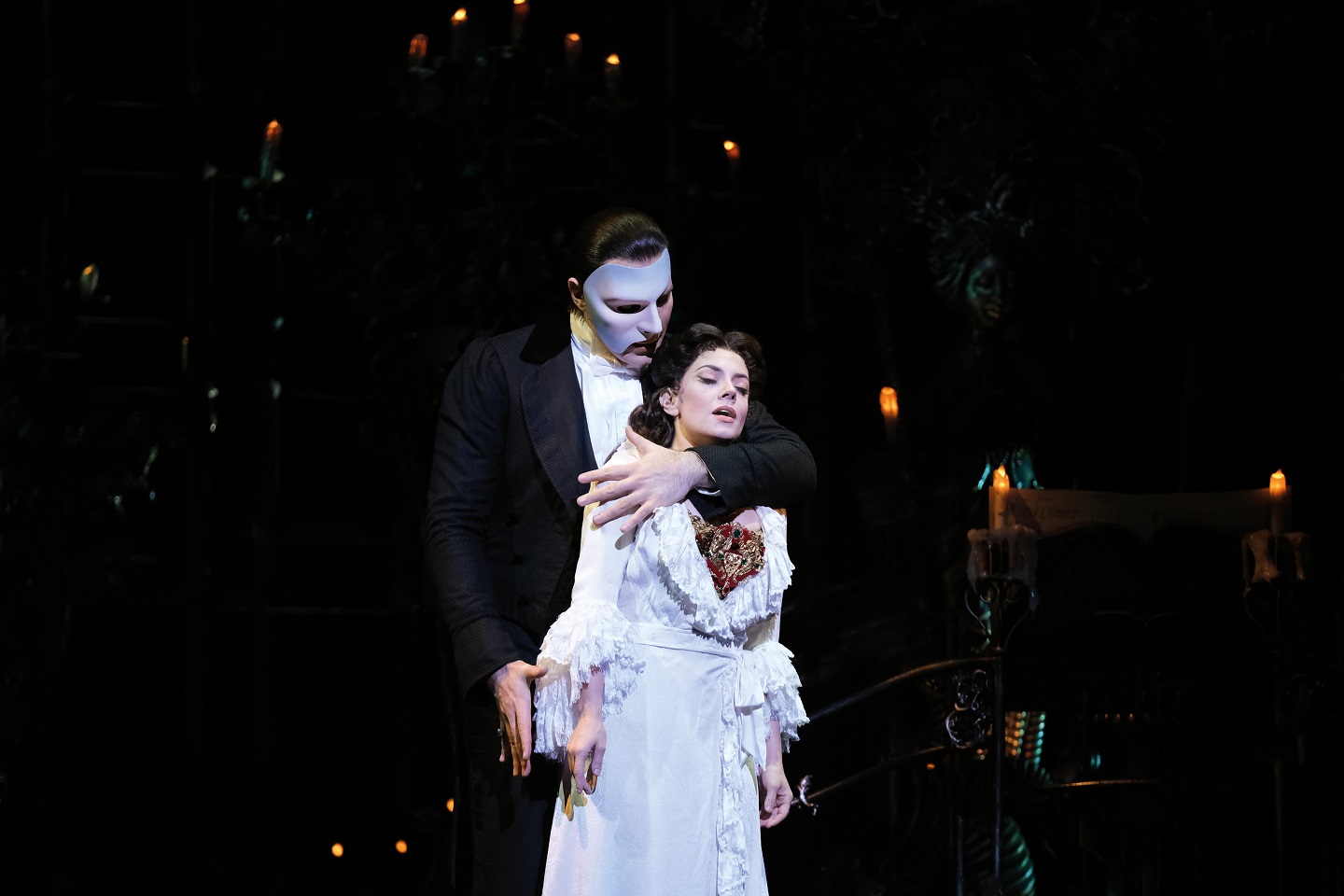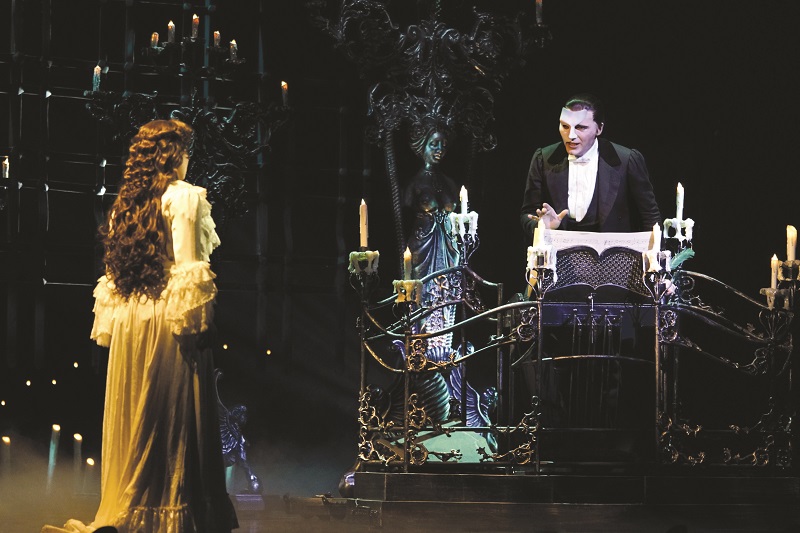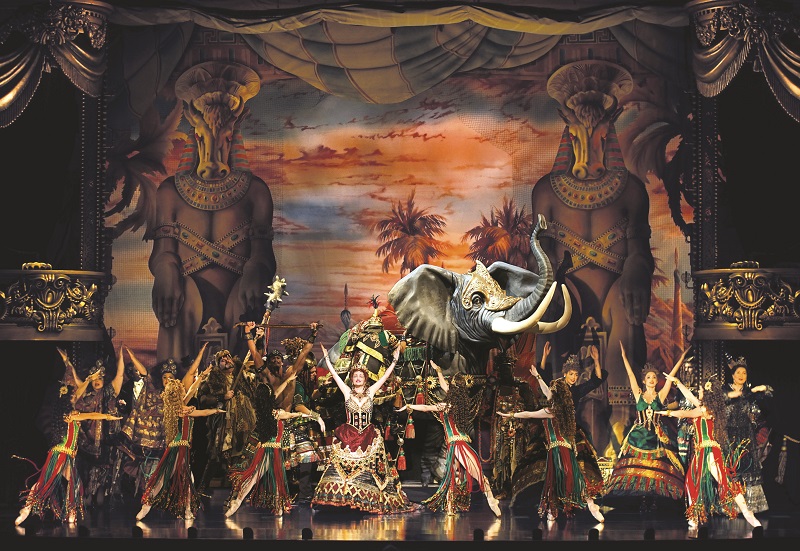
Jonathan Roxmouth plays Phantom for the second time, seen here with soprano Meghan Picerno as Christine Daae (All photos: The Phantom of the Opera World Tour)
Since the chandelier first rose from the stage to the iconic and haunting overture at Her Majesty’s Theatre in London’s West End on October 9, 1986, Andrew Lloyd Webber’s The Phantom Of The Opera has chalked up a multitude of impressive achievements, accolades, and records. Most notably, the US production is the longest running musical in Broadway history and at 33 years and counting, the UK production is the second longest running musical in London’s West End.
Marking another first, the musical — which is inspired by French author Gaston Leroux’s 1909 novel — will make its debut in Kuala Lumpur this June, as part of an ongoing world tour. Having just completed its foremost engagement in Manila, the Philippines, this week sees its month-long run in Singapore begin and after the stop in Malaysia, the show will travel to Tel Aviv in Israel and Dubai.
Known for its ardent fandom — perhaps comparable to the hypnotic spell the phantom casts on his ingénue Christine Daae — there has been no end to discussions on the enduring popularity of the show. Certainly, when Options was invited to visit the cast and creative team of the tour in Manila, the show’s larger-than-life legacy loomed over our conversations about the production itself.

“Phantom is an adjective in itself in the musical theatre world,” says Jonathan Roxmouth, who stars in the titular role for the second time. “When someone stages a gothic musical, it draws comparisons like ‘oh, that’s very Phantom’ but, in turn, Phantom reminds you of nothing else — it is a show that starts with an auction and then suddenly there’s a chandelier, then there’s a boat and a ghost … it’s insane, it’s from a golden age of theatre that people are still trying to emulate today.”
Matt Leisy, the British-American actor who plays Viscount Raoul de Chagny, agrees. “I have never been in a show that affects people so strongly. Literally every day we are contacted by people on social media, sharing how special the evening they watched the show was for them, even weeks later.”
“You could not get that with Grease, The Musical,” Roxmouth grins, adding more seriously, “I was one of those people when I saw it for the first time in 2004, so I know how that felt. It is the silence, there is no other show that gives silence the way this one does. If you can elicit stillness in a performance, that is the greatest honour — except when they break into applause of course — where people just sit there with a drawn in expression. Phantom gets a lot of that.”
Playing the 1880s rising opera star Christine Daae is New York-based soprano Meghan Picerno. Interestingly, Picerno’s first live Phantom experience was rather recent, when Harold Prince — she was working with Prince, the director of the original production, in 2017 on Love Never Dies, the sequel to Phantom in which she starred as an older Daae for its US tour — asked if she had ever watched the show.
“It was so embarrassing to tell him that I had not, I had only seen the movie version and heard of the songs … so, he got me tickets and I went. And I can say, I was just blown away, even just at the overture. Your body just sizzles when the first notes are played, it just takes you!” she says.
At this point, to be a little cynical is forgivable, as one cannot help but wonder if they are over-selling it. Perhaps the dramatic flair has seeped across into real life but, undeniably, the statistics and fervency of its fans do speak for itself.
The question why remains. Those who have seen the show — this writer watched it for the second time in Manila before meeting the cast and crew — or even the film would agree that The Phantom Of The Opera cannot be put in a box.
The tour’s assistant director, Rainer Fried, a veteran Phantom tour director of 30 years’ experience, unabashedly calls it magic.
“Something happened almost 35 years ago in a rehearsal room in a theatre in London that was somewhat dysfunctional with friction — as there always is in the creative process — but at the end of the day, a group of people came together and created magic. And that magic has sustained over the years, coming to life on stage every night, and no one can explain what the magic actually is,” he says.
Fried acknowledges that it is not a perfect show, though he says it was an extraordinary one for its time and the spectacle that it was created to be. He also reveals that a contributing factor to its enduring appeal is that Phantom was always conceived to be old-fashioned, and that adds to the sense of timelessness.
“Part of the magic is the tricks, and while today we have much more automation and technology, Maria Bjornson — the original set designer — had the idea that everything that would move on stage, like the chandelier and the candelabras, would technically be movable the way it would have during the 1800s in the Parisian opera house. It was old-school, it was conceived that way,” he says.
Written and imagined as a romantic musical, watching it through a 21st century lens brings with it a heightened awareness and discomfort of seeing a broken madman trying to control every move of an innocent young woman, even if it means murder. On the other hand, the other side of the romance, between Raoul and Christine, comes across as somewhat tepid in comparison.
Fried nods in understanding, “He is a murderer, but people feel such emotion about it. Every time I am in the show and the lights come on, I see emotional faces — joy, tears and laughter. I think it is because of the story, and the way the story is told that connects to people’s emotions. Perhaps they relate to his suffering and find a piece of it inside themselves. And that there is the relevance that lies in the emotional power and truth of the story. The show is old, but the problems between people then and now somehow seem to have remained the same, and this show taps into that.”
The lead actors echo that sentiment, as Picerno calls the portrayal of the role a vulnerable experience each night. Putting her character into context within today’s world — where the Me Too movement is unfolding and the evolution of female empowerment is in the spotlight — she says, “I think what Christine Daae represents is so ingrained into so many different societies across the world that, more than ever, it is really important to realise that you are watching a girl become a woman in the course of this show. She is, of course, a character of her time and while we see her willingly give up her [autonomy] to men in the beginning, she makes her own choice in the end. And as Meghan in 2019, I understand and I am conscious of that journey.”
“On that note, for me, it is about the issue of toxic masculinity,” injects Roxmouth, “I think the men in the audience are most interesting to watch, in terms of how they are affected by it. Yes, we can talk about the murders and all that, but for me he exemplifies someone who is clear about how he feels — he sobs like a five-year-old, basically, from Music of the Night until the final lair scene. Personally, that is something I have had to learn to take on board.”

They credit Fried with giving them the freedom to explore the characters for themselves over many discussions during rehearsals, even if it is a show where it would seem no stone has been left unturned in terms of fresh revelations.
“Even on the first day of rehearsal the creative team encouraged us, saying there is a lot going on in today’s world and so there is a lot that we needed to re-approach. Just because it has been done a certain way and it worked, does not mean that it is the only way,” says Roxmouth.
While it does not mean they could change things around, Fried gave them the room to find their own revelations about their characters, chart their own arrivals at what is a story that is ultimately about love — be it unrequited, rejected or successful.
“Do you know, I was in my 400th show when I was doing Love Never Dies, and I was about to go on stage … I randomly recited one of the lines, and suddenly it was a lightbulb moment, I went ‘Oh my god, that’s why she says it!’ It took me 400 shows to have that epiphany, so I can’t wait to see what I will learn as I wear Christine’s skin every day,” Picerno shares.
Music director David Andrews Rogers puts it succinctly, “It is absolutely vital that the production not be a museum piece.”
Working with a 14-member orchestra, he says it is a privilege to play such a classic composition that is “so complex yet simple and profound”.
Looking forward to coming to Kuala Lumpur and potentially working with local musicians for the first time, Rogers was the associate music director for the Broadway national tour 23 years ago. The revisit this time around has been a pleasure, as he says, “It is extraordinarily well-written, very challenging music. It is not our job to change it, but it is our job to breathe life into these songs and rhythms, to play and sing them exactly as they were written but to sound like it just erupted from our souls that way.”
The stars are all too aware of that privilege and burden. “There are people who come to the show whose grandparents have come decades ago, and they will be expecting the same experience. The pressure is unlike anything I have experienced in any other production, because Phantom is so owned by the audiences that come to it. That is a testament to the writing, to what an incredible piece of theatre it is,” says Roxmouth.
“That’s why it is my job to feel heartbreak and betrayal night after night. It is hard, but we owe it to them, they deserve it,” Picerno concludes with a smile.
'The Phantom Of The Opera' will be performed at Istana Budaya from June 15. See here for tickets.


